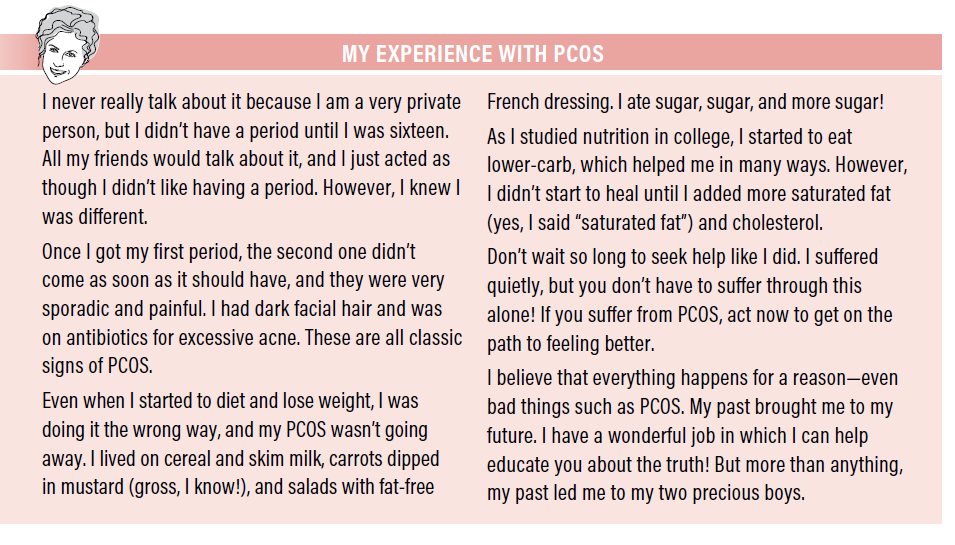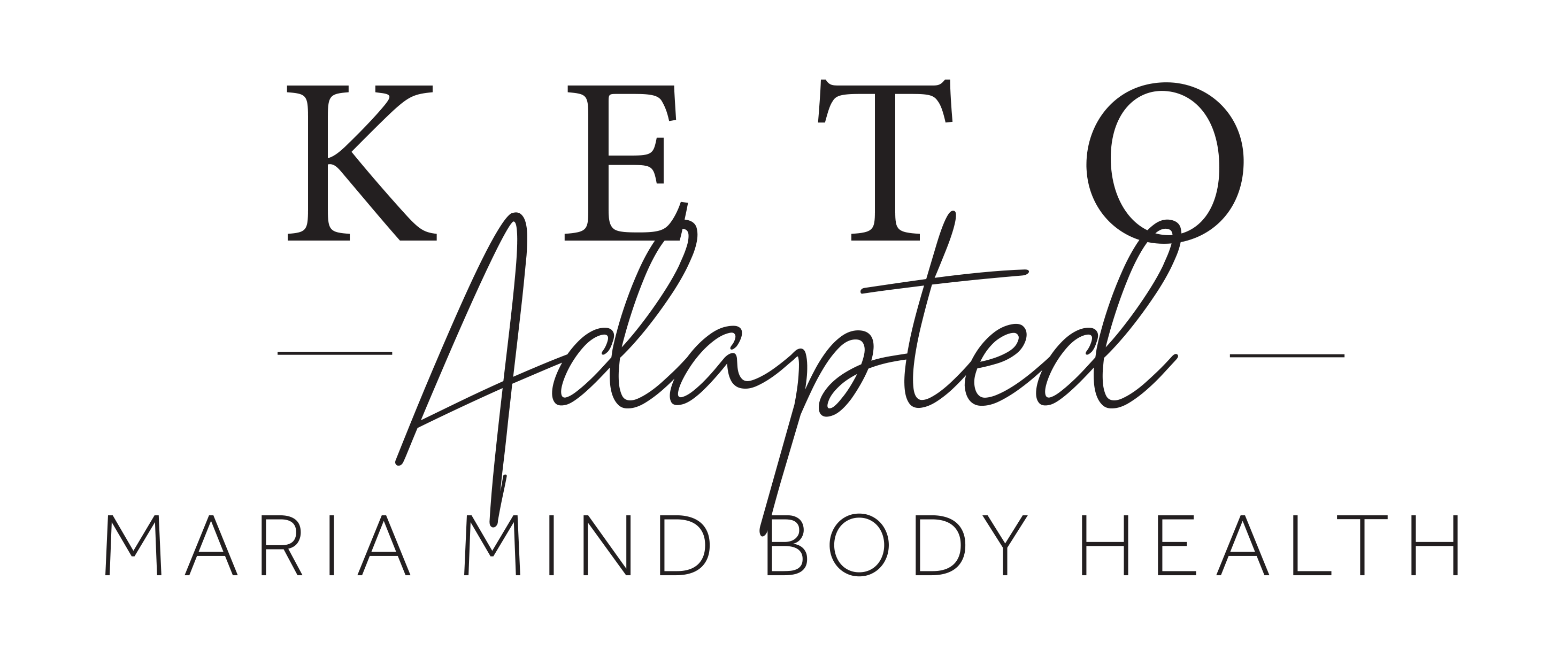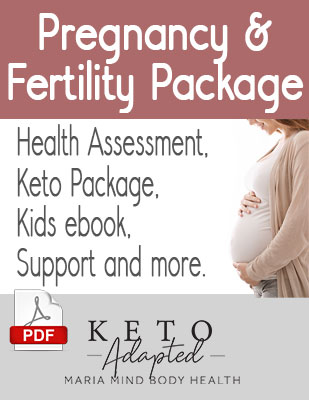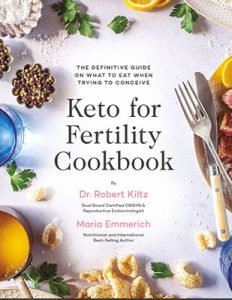Your cart is currently empty!
PCOS and Fertility
We have worked with clients for over 20 years using keto to help with fertility issues. And for over 8 years we have worked with one of the top fertility doctors in the country, Dr Robert Kiltz at CNY fertility who gets some of the highest success rates because he puts every patient on a keto diet.
Estrogen, progesterone, cortisol, DHEA, and testosterone are made from cholesterol; if we don’t eat enough, our bodies take cholesterol from our endocrine system to use for brain function and repair. When that happens, it’s almost impossible for our bodies to maintain proper hormonal balance.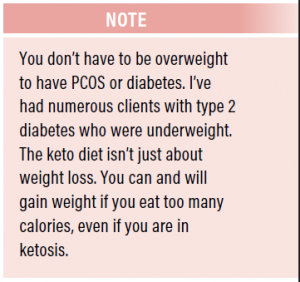
When women follow a low-fat diet, what do they eat instead? Carbohydrates! Those carbs are metabolized into sugars that cause weight gain and insulin resistance, which in turn disrupts ovulation because healthy estrogen is converted to androgens (testosterone). We see this classic sign of PCOS quite often. Starch, sugar, and caffeine increase the production of androgens, and women often complain about dark hairs on their face and inability to lose weight.
We cannot achieve proper hormonal balance and conceive babies without eating adequate amounts of saturated fat. Cholesterol is so important during fertility and pregnancy; it is the foundation of normal cell function, and it helps women digest fat-soluble vitamins like A, D, E, and K, which are essential for the formation of healthy fetuses. Full-fat dairy is filled with healthy cholesterol. People who are sensitive to dairy need to rely on other sources of saturated fats, such as coconut oil, quality animal fats, seafood, and egg yolks.
Hormones are chemical messengers that activate numerous diverse processes in the body, including energy production. Often, one hormone signals the release of another hormone.
When a woman has polycystic ovarian syndrome (PCOS), her hormones fall out of balance. One hormone triggers another, which changes another, and sex hormones get out of whack.
In a healthy female body, the ovaries make a tiny amount of male sex hormones (androgens). In a woman with PCOS, her body starts making too many androgens, which often causes her to stop ovulating, grow excessive facial and body hair, and develop acne. Caffeine aggravates and increases androgens, so you should eliminate caffeine from your diet.
A woman with PCOS has too much insulin and is insulin resistant. When her body doesn’t use insulin well, her blood sugar goes up. Over time, this increases her risk of diabetes.
As you know by now, too much insulin is caused by carbohydrates and sugar, and cholesterol is what makes healthy hormones. We know this from studying breast-fed babies. Breast milk is primarily made up of cholesterol, which is essential for the baby to develop gonads, a thyroid, and other hormones. We get so frustrated when we hear dietitians recommend cutting all cholesterol and saturated fats. If cholesterol is so important to babies, at what point in a person’s life does it change from being a crucial nutrient to a demonized nutrient?
Cholesterol is so important to the human body that nature has devised a backup plan in the event your diet falls short. When that happens, your liver steps in to make cholesterol to give your body a baseline level. If your liver gets overused and tired, thyroid issues also develop because the thyroid hormone T4 is converted into the activated T3 hormone in your liver, not in your thyroid! Taking care
of your liver is extra important!
In a short six-month period, a ketogenic diet for PCOS leads to significant reductions in weight as well as lower testosterone, LH/FSH (luteinizing hormone and follicle-stimulating hormone) ratio, and fasting serum insulin in women with PCOS. All three of these things help reverse PCOS. It might take time to heal decades of abusing your cells, but you will heal.
Estrogen dominance is a huge factor of PCOS. Alcohol is a huge estrogenic toxin (see page 66). Another thing that causes estrogen dominance is topical chemicals and makeup. In the Healthy and Environmental Research on Makeup of Salinas Adolescents (HERMOSA) study in 2016, researchers found that when participants changed their toxic makeup for only three days, the levels of chemicals in their urine went down by 45 percent!4
You might read that someone with PCOS needs to eliminate red meat. What these studies don’t tell you is that they use conventional meat filled with hormones. Please avoid that. Hormones in food are not a good idea for anyone, but especially those who already have hormonal imbalances. Primitive people gave the prized red meat and organ meat to the fertile tribesmen and women to ensure the survival of the tribe. They knew that to have a healthy reproduction, the men and women needed quality protein and fats, and that hasn’t changed over time.
- The following factors can increase PCOS and/or hormonal imbalances:
- Alcohol
- Caffeine
- Carbs and sugar
- Hormones in foods like non-organic meats, flax, chia, and soy
- Trans fats (they form a crust around cells that increases insulin resistance)
- Topical products and other obesogens (foreign chemical compounds that disrupt normal development and balance of lipid metabolism)
- Lack of cholesterol consumption
- Excessive stress
Certain supplements can also increase healing time by saturating the cells with therapeutic doses of needed nutrients.
MODIFICATIONS
For fertility and a healthy pregnancy, do not limit fat; instead, add a lot of saturated fat. Cut all dairy from your diet, however, because a sensitivity to dairy can cause an inability to carry to term and can lead to miscarriage.
SUPPLEMENTS
Iodine: All our hormones need iodine to function, which is why table salt is fortified with it. However, if you are using a quality sea salt, you need to know that it is devoid of iodine, which is why we suggest supplementing with iodine (or eating oysters, which also are filled with zinc, daily). More than 80 percent of the U.S. population is deficient in iodine, leading to miscarriages, lethargy, dry skin, hair loss, constipation, and poor brain development in babies.
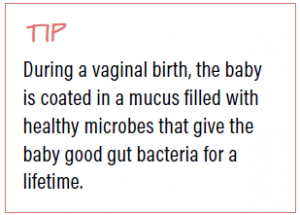
Selenium: Selenium is essential for the conversion of T4 to T3, which is the active form of thyroid hormone. During pregnancy, the immune system goes into overdrive to protect the fetus. After delivering the baby, the mother often produces antibodies against her thyroid; which is one reason women suffer autoimmune thyroid more than men. Adding selenium while pregnant is not only very safe but it also lowers the autoimmune response after giving birth. Take 200 micrograms daily with or without food.
Probiotic: The first two years of life are crucial for long-term immune responses. A pregnant and breastfeeding mother taking probiotics promotes health in infants. Probiotics prevent eczema, diarrhea, diaper rash, and cradle cap; lower the baby’s chances of developing food allergies; and eliminate thrush. Take one capsule of a quality probiotic daily.
There are other supplements that help with fertility, but they need to be determined by each individual’s needs. It requires an analysis of the body’s symptoms and areas of deficiency.
Additional Supplements:
For a full detailed supplement plan go HERE.
We also have a personalized Health Assessment for a custom supplement plan HERE.
Fertility and Pregnancy Package:
For our amazing fertility and pregnancy package, great for those trying to get pregnant or already pregnant or breastfeeding, go HERE to get it. It includes a comprehensive Health Assessment from Maria for personalize supplement plan.
Keto For Fertility Book
I co-authored this great keto for fertility book with Dr Robert Kiltz. It has lots of recipes and information. You can purchase it HERE.
